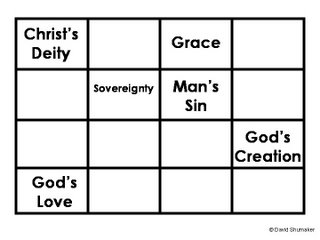Major and Minor Doctrines, among other things
Our discussion on Saturday centered on some of the pros and cons of systematics as well as a discussion on what were the major and minor doctrines of our faith. Here are some of the notes in case you missed it:
Pros of systematics: it gives you a broad overview of several different teachings of scripture, proving them true with many different texts from the Bible. Systematics is also very organized in how it presents the information. Everything the Bible teaches on a given topic, like sin, salvation, sanctification, spiritual gifts, the sacraments, just to name a few, are presented in such a way as to be easily understood.
Cons of systematics: the study can tend to give us a big head and swell our pride about biblical knowledge while leaving out the more practical application points of know theology. There is also the danger of coming up with our own topic instead of a biblical topic and then gathering proof texts to prove our point. Here's a great quote from one of my favorite theology teachers about that:
"Text without context is pretext for prooftext."
We also had a great discussion about major and minor doctrines. Are major doctrines teaching you must believe in order to be saved or can you disagree with a major doctrine and still be a Christian? Some examples we discussed from this category were Creation, God's Sovereignty, and the Trinity. There were also several minor doctrines, like mode of baptism, drinking, tatoos, etc. that we put in the minor category. The goal througout this study is to move more and more of the "minor doctrines" into the major category for each of us. The more we understand any given teaching in scripture, the more confident we should be in our beliefs. Although we may never be 100% sure about the inner workings of a doctrine like God's sovereignty, we can still be confident to know that it is true.
Questions for discussion:
1. Are the doctrines of Grace (total depravity, unconditional election, limited atonement, irresistable grace, and the perseverance of the saints) major or minor doctrines?
2. How does a deeper understanding of doctrine change the way we view God? the way we treat other believers? the way we treat non-believers?
Assignment for next time (Nov. 25 @ the Mission's House):
-Read chapter 2 and be ready to discuss what you learned as well as the questions at the end of the chapter

